
JUDY McLANE
In November 2004 I chatted with the great Judy McLane, who, at that time, was part of a trio of leading ladies, along with Carolee Carmello as Donna and Liz McCartney as Rosie, who had just joined the internationally acclaimed musical Mamma Mia! at the Winter Garden Theatre. About a week ago, I again had the pleasure of catching up with this versatile singing actress, who, after more than seven years, has stepped into the leading role of Donna Sheridan, the independent single mother whose carefree past catches up with her on the eve of her daughter's wedding, in that same long-running hit musical. McLane, in fact, recently welcomed a slew of new co-stars, including Felicia Finley as Tanya, Lauren Cohn as Rosie, Aaron Lazar as Sam Carmichael, Daniel Cooney as Bill Austin, Graham Rowat as Harry Bright, Christy Altomare as Sophie and Zak Resnick as Sky. During her lengthy run in Mamma Mia! — McLane has been a principal player in the production longer than any other actor — the actress has also had a chance to tackle other roles, including a recent turn as Diana Goodman, a mother battling depression and bipolar disorder, in Pioneer Theatre Company's fall 2011 production of the Pulitzer Prize-winning Next to Normal. In our recent interview McLane, a Drama Desk nominee for her work as Vienna in Off-Broadway's Johnny Guitar and a Helen Hayes Award nominee for her role as Phyllis in the Signature Theatre's acclaimed production of Stephen Sondheim's Follies, spoke about her work in Next to Normal, singing the demanding title role in two different productions of Evita and, of course, her new role in Mamma Mia!; that interview follows.
Question: How are you?
Judy McLane: I'm great! [Laughs.] Here I am in Mamma Mia! seven-and-a-half years later. Isn't that crazy?
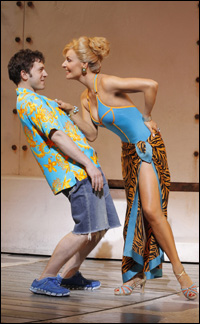 |
||
| McLane (with Jacob Pinion) as Tanya |
||
| photo by Joan Marcus |
McLane: For Mamma Mia!, I initially went in for Donna seven-and-a-half years ago in 2004…and got a callback, went into the callback, and by that time — in the between time — they had hired Carolee [Carmello] because she's fabulous. And, I got to the audition, and I sang "Winner." They said, "We love you. We want to use you. Can you read Tanya?" And, I said, "Well, I haven't looked at this. Can you give me a minute?" So I went in the hallway with David Grindrod, and we went over the scene and went back in, and I got a call the next day for Tanya. So that was that! Question: When or how did it come up again, the possibility of you switching roles?
McLane: They called and asked if I would come in again, and you know, I wanted to keep it very much on the down low… It was a pretty fast change because all of our creatives were in Argentina putting in another company, so they did a pretty fast changeover this time — a whole new company of seven new people. So they called and said, "Would you come back in and audition for Donna?" I got a call from Eric Woodall at casting, and to be honest, I wasn't sure. At first, I thought, "Oh, do I want to invest in this?" When you put a role on the shelf, you say, "Okay, I'm done with that." And, I wasn't sure. I had to think about it for a day or two. And then I realized, "Wow. I have been with this show. I adore the show. It's a great role. I might as well go in and invest again." That's what happened. I basically said, "Okay. I'm going to go back in and do this."… And, it felt really great singing this stuff. Then they called. And, it's so funny… Weeks before that, I was doing a reading of a show with Felicia [Finley], and I turn to Felicia and I said, "Felicia, you need to be doing my role in Mamma Mia!" [Laughs.] This was months before any of this happened. And, she said, "Oh, my goodness… Well, okay." I said, "Yeah, you need to do my part." And, I went back to the theatre and actually sat and told other people, "Felicia Finley would be amazing [as Tanya]. They need to hire her." And, next thing I know, I'm auditioning, and I find out that Felicia is playing Tanya. Now, I didn't tell anyone — I had no influence over them — but it was just funny that was kind of put out there in the world, so I am thrilled she's there. Thrilled!
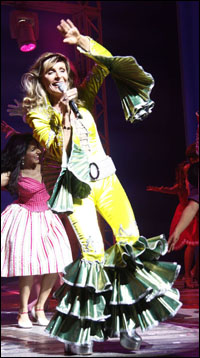 |
||
| McLane in her first performance as Donna |
||
| Photo by Joseph Marzullo/WENN |
McLane: You know, it's interesting. It feels like a brand-new show because when I wasn't on stage, I wasn't seeing the show, and after a while, you don't hear it anymore, really. You're backstage… So it felt, going into rehearsals, I really felt like it was a brand-new show. There is one moment, and that is the only moment that physically is hard to get out of my body, and that's the jumps that I do. I usually do the first jump in "Dancing Queen," and last night, it was the first time I actually went to do it twice!… Just physically. I wasn't feeling the part, but it was just musically and physically. Other than that, I look at the costumes — it seems like a different character to me, totally. It's bizarre. I think it's because I'm just focused on Donna and just trying to find that road and discover this kind of journey that she's taking. I'm very separate from it. And, most people have asked me that question, "Isn't it strange seeing people…?" It's like, "No, it fits somehow." I think Donna, in so many ways, fits me more in a lot of ways — she's got her feet on the ground, a hiker. That's kind of what I am. I'm an Earth-girl, so it's kind of fun to go to that part.
Question: What are some of the moments that you're enjoying as Donna?
McLane: Oh, my gosh! Well, I get to sing, Andrew! [Laughs.] I get to sing. They call it the Donna-thon. The second act is about three or four songs in a row, so it's really great. I have to say, Mamma Mia! has been so amazing over the years — letting me go to do my symphony work. I went out to do Next to Normal. So they've given me so many amazing opportunities. I feel so blessed by this job. Now I'm actually doing the singing in the show, and it's great. I get to sing with Aaron Lazar, who is just a dreamboat to sing with. I wish we had more together to sing, but we don't. And, I couldn't have asked for a better Sophie. Christy [Altomare] is just fantastic. This girl is a little go-getter. She's just amazing. I think I love singing my duets even more so than the solos. That's really been fun.
Question: In terms of stamina and endurance, what's this role like compared to playing Tanya?
McLane: So different. So different. Tanya was all about the physical… And, so is Donna in a lot of ways. I'm still dancing a lot, but I'm out of my four-and-a-half inch heels. Seven-and-a-half-years of four-and-a-half inch heels is a little crazy! [Laughs.] So I'm not doing as much physical therapy. [Laughs.]… I still do my yoga every day because that's part of who I am, but it's more the vocal [demands]… Sunday was day off, and now I'm calling it Silent Sundays. I'm writing notes to everybody because I just need to find my pacing, find out, vocally, where it fits. Especially coming out of the rehearsals and all the run-throughs and doing the show — that's the tough time. For me, it's going to be more about pacing my singing. No more red wine for the year! [Laughs.]
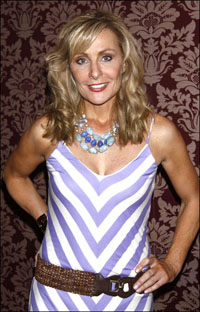 |
||
| McLane following her first performance as Donna on June 4 |
||
| photo by Joseph Marzullo/WENN |
McLane: Oh, my gosh! Red wine is the worst. I can drink a glass of red wine and wake up the next morning and have no voice. It's weird. It's so drying. So that's going to be the difference, and I find that that's going to be my test. I'll spend a lot of quiet time this year. It'll be a very quiet year! [Laughs.] Other than singing on stage… until I get into the groove of it. Question: Having seen so many different women do the role over the years, how did you go about finding your own version?
McLane: Well, it's hard because there are so many brilliant — like I said, Carolee, Beth [Leavel] — and everybody's got their own individual thing. And, that's what I think I found the most — Donna works when you really come from who you are first — your individual stuff… I work a lot kind of kinesthetically — physically — like where does she fit in my body kind of thing. Once I find that physical life — along with the emotional at the same time — but when I find that, that tends to help me. The physical part really helps me a lot — finding my ground and finding where my body is in different parts of the play. I know that sounds strange, but that's kind of a lot of what it is. And, having lived a lot, I have a lot of, I should say, "Donna Experience." You know, married twice, had breakups. I'm familiar with them, so that kind of helps, too, because I have some things I can draw on, which is kind of fun. I guess it's not fun, but I'm grateful for it. [Laughs.]… People say, "Well, don't you remember when this person did this and this person did that?" When I'm playing a role on stage, I'm not one of those people who learns [everyone else's] lines and knows every word. I'm just not one of those people. In fact, when the audition came, two nights before the audition, my friend Tony was like, "You need to learn these lines. You're not getting the lines right." [Laughs.] He was helping me learn them. I'm just not one of those people. When I'm in my part, that is what I'm doing, and that's what I'm focused on and relating. I'm not anticipating someone's line. It's very odd. Even though you'd think I'd seen many people, I don't really remember a lot of what they did. I know the essence of what I got from them, which is incredible, but I'm really trying to find my own. It's been fun to do that.
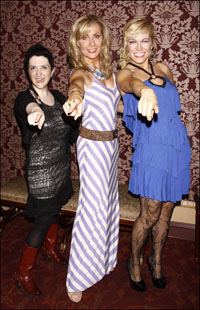 |
||
| McLane (center) with the new Rosie, Lauren Cohn (left) and Tanya, Felicia Finley (right) |
||
| Photo by Joseph Marzullo/WENN |
McLane: Well, as I said, I even look at the costumes, and because it feels like a new show to me, I'm looking at them, and I'm not even picturing myself in the costumes. It's bizarre. I can't even explain it… It's such a great fit for Felicia… I don't know, it's very odd because the work I'm doing for Donna, I'm looking at Tanya from a different perspective. Does that make sense? Tanya and Rosie are now, to me, from Donna's point-of-view, these amazing best-friends-for-life kind of thing. So I'm putting a different kind of feel on Tanya from the Donna perspective. So I don't look at her "as myself." I look at her as a friend of Donna — of mine.
Question: Now that you've been playing her for a couple of weeks, how would you describe Donna? What have you found out about her?
McLane: Well, I'm only in my second week, so it's been crazy. It's been one week! The first week was like being shot out of a cannon. [Laughs.] What are these clothes? Who are these people? I have an advantage, in fact, because I do know what the energy of the show is — thank goodness. I do know that, and that's a little more difficult for the people who haven't been in the show. It's a beast when it comes to energy — like no other show I've ever done — so at least I know that. I now am finding out the pacing of her and also finding out how beautiful, actually — and I'm saying this about Mamma Mia! — how beautiful the story is… And, for me in my life, it's like, "There's always time for second chances." It's a very hopeful kind of thing, so I'm finding that journey of second chances — new beginnings. And, I'm in a new beginning for myself, so it's coinciding really nicely with this thing of new beginnings and positive feel. And, I'm also loving the mother-daughter [relationship] because I don't have a daughter. I have nieces and nephews, but I'm loving discovering that kind of a relationship and finding what that's about and all the different levels that go with a mother-daughter thing. The girl being younger and getting married, the responsibility, the jealousy, the frustration — all of the things that come with having a daughter — that's really been kind of fun for me.
Question: What is it like at the end of the show coming out doing the finale in the spandex and…?
McLane: For many years I've been in a supporting part… For me, I'm really feeling comfortable kind of taking over and stepping into the lead of it to lead the company. It's an amazing company. It's probably one of the happiest places I've ever worked. It's got a great vibe backstage, and I just want to continue that — feel like I'm a leader of this really wonderful feeling show that we're giving to people. So it feels great to be center and see that audience when they stand and scream and know that we're giving them something that's really positive — they walk out wanting more, which is a good thing. So I feel like I'm stepping in to lead the company, which feels really nice. After being it in so many years as a person and as a company member, but now I feel like I have a responsibility to take the lead.
 |
||
| McLane at curtain call |
||
| photo by Joseph Marzullo/WENN |
McLane: It's amazing… I've had many people come — and I think that was my goal with Tanya after seven-and-a-half years — I've had people come and say, "Did you just join the company?" That, for me, was my number one goal that every time I went out there, it had to be fresh and new. And, it was a different challenge as an actress. It had to keep me more in the moment… After being with something, you constantly try to find new and fresh, and when you have different people coming into the show every year, that helps so much. It's a really smart thing that they do. I hate the fact that you lose people and they come and go, and that's very sad — and that will be me next year — but there's something about that freshness that this show needs. It actually craves that. It has to have some kind of freshness to it. It can't just be phoned in. I don't phone-in on my shows, that's for sure. You can't. Question: Why do you think it continues to be such a hit with audiences?
McLane: I think that it takes the place of a Prozac or a Zoloft. [Laughs.] That's what I call it. I call it the anti-depressant. A friend of mine, just the other night, came. She said, "I sat down — and I had seen the show — but as I sat there, I lost myself for that two-and-a-half hours. I got so wrapped up, and I got lost, and it made me feel good." And, I think it's the accessibility of the music. I mean, you can't deny ABBA. It's something that's accessible to people and they can pick up and hum. I know that the music is probably the biggest part of it. But I also know that they were very smart in the way that they designed the show. There is someone in the show that almost everyone—almost everyone—can relate to a character that's on the stage. I think that's why we go—sometimes to relate to that, to have empathy with a character on stage. I think that's what we connect to as people. It's that Deepak Chopra thing of universal consciousness—we're all related on some level—and I think when we go to the theatre, that's heightened to a certain degree.
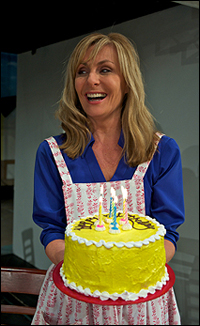 |
||
| McLane in Next to Normal. |
||
| Photo by Alexander Weisman |
McLane: It was probably my biggest accomplishment I've ever done. I know that [Donna is also] a huge thing… In the way of what I had to bring to it as an actress — so much. I mean, vocally so much, but the journey — the emotional journey — is like nothing I've ever done. Yeah — nothing…ever. I felt really satisfied. I would have liked it to have been a little bit longer, but I'll have to do it again sometime… To establish that kind of bipolar [existence] and to find those suicidal tendencies and all of those things I've never experienced, it was such a journey. I did a lot of research for it, even though it was a very short amount of time. I spoke to a lot of people. My goal with that show was to really come from a place where a bipolar person is, not just all-across-the-board crazy—to really find all the levels of what that means to someone really living with that unfortunate condition. And, it was such an amazing ride to find the highs and lows of that show. I don't think I've ever dipped so high and dipped so low in a show. I mean, I'm not finished with it. I don't know how many roles I'm ever really finished with. I'm probably finished with Tanya! [Laughs.] Seven-and-a-half-years… I really think I'm done! But [Diana] is a kind of a role I think is a "lifetime role" — to understand that sort of pathology, it would take so, so, so, so long. And, what was lovely about that was you would have people come after — and I never had that effect before… At the stage door, I've had people say, "Oh, my God! It was great. I had fun… Fabulous!" But people literally coming and crying in your arms and saying, "That was my life on stage. You were playing me," and that was pretty powerful. I mean, that's why we do theatre — to move people. So, I hope I did it justice in that way — I really hope I did. But, like I said, it was a short run, so there's so much to it, but I felt like I at least got in the ballpark with it.
Question: Had you seen the show either Off-Broadway or Broadway, and did you think that was a part you'd like to tackle?
McLane: Well, it's so funny because when it was done at [ Second Stage], Paul Hardt, who is a dear friend of mine — he's a casting director — he said, "Run to see this show. You are going to play this part. Run to see this show!" [Laughs.] Of course, I never auditioned for it here in New York ever, but he was very funny, so I had it in the back of my mind, and then he actually took me to see the show. We went to see it on Broadway. I went to see it with him there, and he said, "You're going to play this role sometime." And, I said, "Yeah. I think I would love that." [Laughs.] "It would be fantastic. I would love that." So I was thrilled. And, I was more thrilled [because] Mamma Mia! did not have to let me go. They really didn't, and Devin Keudell, who's one of the most amazing men in the business… I said to him, "Devin, I love my job. I love what I do at Mamma Mia!, but I'm so grateful and thankful that you're letting me go and do this." He said, "You'll love your job more when you come back," so he got it. He knew what this part was, and that it's something that an actress needs is to keep feeding their soul in that way, so he was amazing.
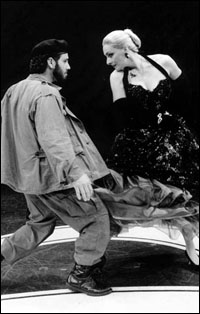 |
||
| McLane, with Dan Cooney, in Evita. |
McLane: Well, you know what's really fun is Dan Cooney, who is now playing Bill — our new Bill in the show — we did it twice together. He was my Che twice. We did it at Paper Mill and the Muny together, so it's so fun to have him in the cast because we have such a history. That music is just ridiculous — to sing that. I don't think there is a score that is more difficult for a woman to sing. Really and honestly true… I think when I learned how to sing Evita is when I really learned [how to belt]. Because I started out as an opera singer… In college, I was actually a classical major. And, when I came to New York, Bill Schuman — who I think I pretty much might owe my whole career to — he's my voice teacher… He looked at me and said, "What do you want to do?" I said, "I want to do musical theatre." And, he said, "Well, you don't look like a soprano, so you have to learn how to belt!" [Laughs.] So he taught me from scratch! I came here out of college not knowing how to belt — not knowing at all. And, that's how I've made my career. After studying with him for many years, Chess was my first Broadway show. It was because of him that I got it. Honestly, I really owe it to him. He taught me how to do it in a safe, healthy way. He was at my opening night the other night for Donna, which was great… When I actually first did Evita, that was a big, big thing for me at the time because that's probably the biggest belting role you can do for a woman… And, for me, it was a huge personal accomplishment because I worked on it for years — with him. He taught me how to do it. It's so funny, years ago, when I got Johnny Guitar and the whole Drama Desk came up, I was nominated with Elaine Paige, who I had listened to and listened to and listened to sing that… And, of course Patti [LuPone], who I listened to forever… It was just crazy, you know. So it's been a real journey with that, in a lot of ways — that whole belting thing. No one knew I could sing soprano. It's very funny, but it's like I just put it under the carpet for a while. [Laughs.]
Question: That's so interesting. Was there any fear on your part in learning how to belt? I know some opera singers won't explore that part of their voice.
McLane: When I was in my junior and senior years of college, I knew there was something more to my voice, but I was studying classically and didn't know, and I thought, "What is this?" And, it wasn't a time when everybody was doing belting. I was coming from a place where I wanted to sing, and I had sung with my guitar in college, and I knew there was more to my voice, I just didn't know how to do it. I was afraid, but I had such trust in [Bill] to do it. It's so funny because I remember — vividly remember — going into my first audition and belting a C. [Laughs.] A C above middle C. I was like, "Okay, I'm going to do it. I'm going to go in and do this." I remember it was at Nola Studios. I walked in and I thought, "Oh, the C. Oh, my God!" And, it was just the biggest thing. Since then, I've done probably all — at least most — of the major belt roles at some point of my career. So it's so different. I was very fearful at first because I didn't know what it was, really, in a way. Even though I had experimented with it, but I think innately it was my voice — I found what my voice truly was. The classical wasn't it. Even personal — like who I am as a person — I'm not that type of singer. That's not what is in my soul. I found it initially — getting here and finding Bill. He really helped me find that, so that was a huge journey.
[The Winter Garden Theatre is located in Manhattan at 1634 Broadway. For more information visit mamma-mia.com.] Well, that's all for now. Happy diva-watching! E-mail questions or comments to [email protected].










